
The Band was a Canadian-American rock band formed in Toronto, Ontario, in 1967. It consisted of Canadians Rick Danko, Garth Hudson, Richard Manuel, Robbie Robertson, and American Levon Helm. The Band combined elements of Americana, folk, rock, jazz, country, and R&B, influencing musicians such as George Harrison, Elton John, the Grateful Dead, Eric Clapton and Wilco.
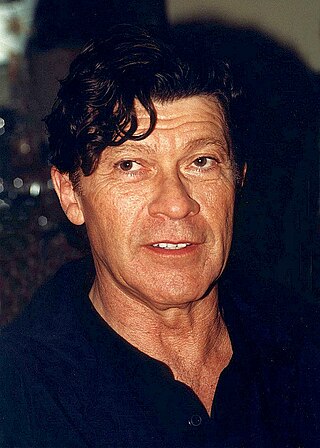
Jaime Royal "Robbie" Robertson was a Canadian musician. He was lead guitarist for Bob Dylan in the mid-late 1960s and early-mid 1970s, guitarist and songwriter with the Band from their inception until 1978, and a solo artist.

Mark Lavon "Levon" Helm was an American musician and actor who achieved fame as the drummer and one of the three lead vocalists for the Band, for which he was inducted into the Rock and Roll Hall of Fame in 1994. Helm was known for his deeply soulful, country-accented voice, multi-instrumental ability, and creative drumming style, highlighted on many of the Band's recordings, such as "The Weight", "Up on Cripple Creek", and "The Night They Drove Old Dixie Down".
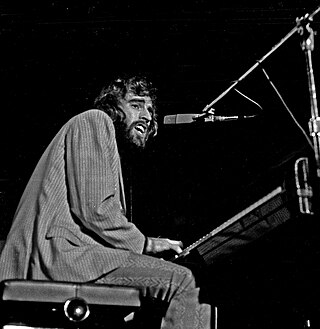
Richard George Manuel was a Canadian musician, singer, and songwriter, best known as a pianist and one of three lead singers in The Band, for which he was posthumously inducted into the Rock and Roll Hall of Fame in 1994.

Eric "Garth" Hudson is a Canadian multi-instrumentalist best known as the keyboardist and occasional saxophonist for rock group the Band, for which he was inducted into the Rock and Roll Hall of Fame in 1994. He was a principal architect of the group's sound, described as "the most brilliant organist in the rock world" by Keyboard magazine. With the deaths of Richard Manuel in 1986, Rick Danko in 1999, Levon Helm in 2012, and Robbie Robertson in 2023, Hudson is the last living original member of the band.
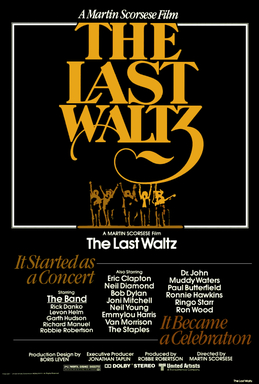
The Last Waltz was a concert by the Canadian-American rock group The Band, held on American Thanksgiving Day, November 25, 1976, at Winterland Ballroom in San Francisco. The Last Waltz was advertised as The Band's "farewell concert appearance", and the concert had The Band joined by more than a dozen special guests, including their previous employers Ronnie Hawkins and Bob Dylan, as well as Paul Butterfield, Bobby Charles, Eric Clapton, Neil Diamond, Emmylou Harris, Dr. John, Joni Mitchell, Van Morrison, Ringo Starr, Muddy Waters, Ronnie Wood, and Neil Young. The musical director for the concert was The Band's original record producer, John Simon.

Rock of Ages: The Band in Concert is a live album by the Band, released in 1972. It was compiled from recordings made during their series of shows at the Academy of Music in New York City, from December 28 through December 31, 1971. It peaked at No. 6 on the Billboard 200 chart, and was certified a gold record by the RIAA. An expanded release of recordings taken from the same series of shows, called Live at the Academy of Music 1971, was released in 2013.
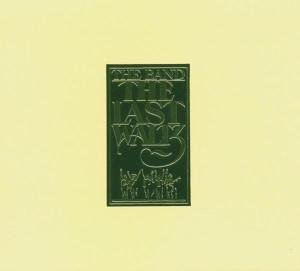
The Last Waltz is the second live album by the Band, released on Warner Bros. Records in 1978, catalogue 3WS 3146. It is the soundtrack to the 1978 film of the same name, and the final album by the original configuration of the Band. It peaked at No. 16 on the Billboard 200.
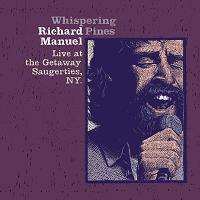
Whispering Pines: Live at the Getaway is a live recording by Canadian singer Richard Manuel, chronicling two intimate live shows Manuel performed at The Getaway, a nightclub in Saugerties, New York on October 12, 1985. Released in Japan in March 2002, it is the first solo release from Manuel, who, unlike his former mates from The Band never recorded a proper solo album.

Jubilation is the tenth and final studio album by Canadian/American rock group the Band. Recorded in the spring of 1998 in Levon Helm's home studio in Woodstock, New York, it was released on September 15, 1998. For the first time since the group reformed without guitarist and songwriter Robbie Robertson, there were more originals than covers. Songs include "Last Train to Memphis", featuring guest guitarist Eric Clapton, Garth Hudson's solo instrumental closer "French Girls", Rick Danko's "High Cotton" and the ode to Ronnie Hawkins, "White Cadillac".

Live at Watkins Glen is a 1995 album by the Band, presented by Capitol Records as a live album from the Summer Jam at Watkins Glen rock festival held outside Watkins Glen, New York, on July 28, 1973, in front of 600,000 people. Garth Hudson's organ solo, "Too Wet to Work", and the plainly titled "Jam" come from the actual Watkins Glen concert, as does the introduction of the group by Bill Graham. The former track appears on the out-of-print 1994 box set Across the Great Divide, but the latter track is only present on the Watkins Glen disc. The remainder of the tracks are two studio outtakes with overdubbed crowd noise, "Back to Memphis" and "Endless Highway", plus five tracks from the Academy of Music shows in December 1971 and "Don't Ya Tell Henry" from the Woodstock festival in 1969. The two studio outtakes are available on the 2001 re-release of Moondog Matinee, without the crowd overdubs. The Academy of Music tracks are available on the 2001 two-CD re-release of Rock of Ages as "previously unavailable" tracks.
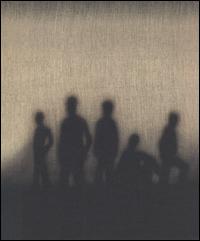
A Musical History is the second box set to anthologize Canadian-American rock group the Band. Released by Capitol Records on September 27, 2005, it features 111 tracks spread over five compact discs and one DVD. Roughly spanning the group's journey from 1961 to 1977, from their days behind Ronnie Hawkins and Bob Dylan through the departure of Robbie Robertson and the first disbanding of the group. The set includes highlights from each of the group's first seven studio albums and both major live recordings and nearly forty rare or previously unreleased performances.
"This Wheel's on Fire" is a song written by Bob Dylan and Rick Danko. It was originally recorded by Dylan and the Band during their 1967 sessions, portions of which comprised the 1975 album, The Basement Tapes. The Band's own version appeared on their 1968 album, Music from Big Pink. Live versions by the Band appear on their 1972 live double album Rock of Ages, as well as the more complete four-CD-DVD version of that concert, Live at the Academy of Music 1971, and the 2002 Box Set of The Last Waltz.
"Chest Fever" is a song recorded by the Band on its 1968 debut, Music from Big Pink. It is, according to Peter Viney, a historian of the group, the album track that has appeared on the most subsequent live albums and compilations, second only to "The Weight".
"King Harvest (Has Surely Come)" is a song by The Band, which originally appeared as the final track on their second album, The Band.

"Stage Fright" is the title track of the Band's third album, Stage Fright. It features Rick Danko on lead vocals and was written by Robbie Robertson. According to author Barney Hoskyns, Robertson originally intended it to be sung by Richard Manuel but it became clear that the song was better suited to Danko's "nervous, tremulous voice."
"It Makes No Difference" is a song written by Robbie Robertson and sung by Rick Danko that was first released by The Band on their 1975 album Northern Lights – Southern Cross. It has also appeared on live and compilation albums, including the soundtrack to the film The Last Waltz. Among the artists that have covered the song are Solomon Burke, My Morning Jacket, The Icicle Works, Trey Anastasio and Over the Rhine.

"The Shape I'm In" is a song by The Band, first released on their 1970 album Stage Fright. It was written by Robbie Robertson, who did little to disguise the fact that the song's sense of dread and dissolution was about Richard Manuel, the song's principal singer. It became a regular feature in their concert repertoire, appearing on their live albums Rock of Ages, Before the Flood, and The Last Waltz. Author Neil Minturn described the song as "straightforward rock." Along with "The Weight," it is one of the Band's songs most performed by other artists. It has been recorded or performed by Bo Diddley, The Good Brothers, The Mekons, The Pointer Sisters, She & Him, Marty Stuart and Nathaniel Rateliff and the Night Sweats.
"When You Awake" is a song written by Robbie Robertson and Richard Manuel that was first released on The Band's 1969 self-titled album The Band. A live performance was included on the Bob Dylan and The Band live album Before the Flood.

The Night They Drove Old Dixie Down: The Best of the Band Live in Concert is a 1990 compilation of live recordings from American roots rock group the Band released by CEMA Special Markets.















